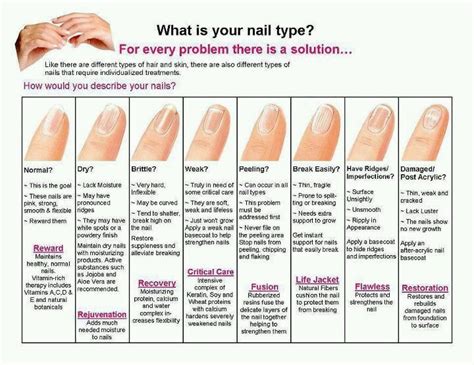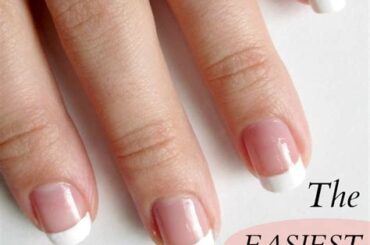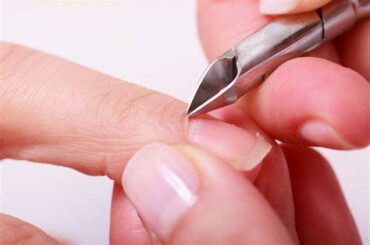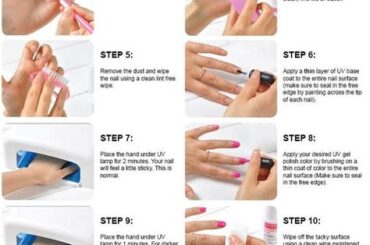Understanding Your Nail Type
Understanding Your Nail Type is essential for proper nail care. Every person has a unique nail type, which can vary in terms of strength, flexibility, and moisture levels. By understanding your nail type, you can tailor your nail care routine to address specific concerns and maintain healthy nails.
There are generally five main nail types: normal, weak and brittle, dry and dehydrated, soft and flexible, and healthy and strong. Identifying your nail type can be done by observing the characteristics of your nails and understanding how they behave.
Normal nails are characterized by being neither too soft nor too hard. They have a balanced level of moisture and are generally strong and flexible. If you have normal nails, consider yourself lucky as they are the easiest to care for. Regular nail care routines, such as trimming, filing, and moisturizing, are sufficient to keep normal nails in good condition.
- Weak and brittle nails, on the other hand, are prone to breakage and splitting. They often have a thin and fragile texture. If you have weak and brittle nails, it’s important to strengthen them by using nail strengthening products and avoiding harsh chemicals and excessive use of nail polish remover. Regular moisturizing and wearing gloves for chores can also help protect weak nails.
- Dry and dehydrated nails lack moisture and may appear dull and brittle. They are often caused by exposure to harsh chemicals, excessive hand washing, and frequent use of nail polish remover. To care for dry and dehydrated nails, moisturize them regularly using cuticle oils or creams. Avoid using acetone-based nail polish removers and opt for gentler formulas.
- Soft and flexible nails are prone to bending and breaking. They are often caused by genetics or excessive moisture exposure. To care for soft and flexible nails, avoid prolonged exposure to water and harsh chemicals. Trim and file them regularly to prevent snagging. Using nail hardeners and protective top coats can also help strengthen soft nails.
- Maintaining healthy and strong nails requires a balanced approach. Regular nail care practices such as proper trimming, filing, and moisturizing are important. Additionally, protecting nails from harsh chemicals, wearing gloves for chores, and avoiding excessive use of nail polish remover can help maintain the strength and health of your nails.
Understanding your nail type is the first step towards achieving healthy and beautiful nails. By identifying your nail type and following the appropriate care routine, you can strengthen weak nails, moisturize dry nails, protect flexible nails, or simply maintain the health and strength of normal nails. Remember, taking care of your nails is not only about aesthetics but also about overall nail health.
Caring for Weak and Brittle Nails
Weak and brittle nails can be a frustrating problem to deal with. They are more prone to breakage, peeling, and splitting, making it difficult to maintain long and beautiful nails. However, with the right care and attention, you can improve the strength and health of your nails. Here are some tips to help you care for weak and brittle nails.
1. Keep Your Nails Short:
When you have weak and brittle nails, it’s best to keep them short. Long nails are more likely to break or snag, causing further damage. Regularly trim and shape your nails using a nail file. Be sure to file gently in one direction to avoid jagged edges. By maintaining short nails, you can reduce the risk of breakage and allow your nails to grow stronger.
2. Moisturize Regularly:
Dryness is one of the common causes of weak and brittle nails. To combat this, it’s essential to keep your nails moisturized. Apply a nourishing hand cream or cuticle oil to your nails and cuticles daily. Massage the product into your nails to promote blood circulation and improve overall nail health. Additionally, consider wearing gloves while doing household chores or when exposed to harsh chemicals to protect your nails from further damage.
3. Avoid Harsh Nail Products:
Using harsh nail products can worsen the condition of weak and brittle nails. Avoid using nail polishes and removers that contain harsh chemicals such as formaldehyde, toluene, and acetone. Instead, opt for gentle and nourishing nail products that are specifically formulated for weak nails. Look for products enriched with ingredients like biotin, vitamin E, and calcium, as they can help strengthen and protect your nails.
4. Protect Your Nails:
Protecting your nails from external factors is crucial in caring for weak and brittle nails. Wear gloves when you expose your hands to water for an extended period or when working with cleaning agents. Moisture can weaken the nails, so it’s important to keep them as dry as possible. Additionally, when engaging in activities that may cause trauma to your nails, such as gardening or household repairs, consider wearing protective gloves to prevent breakage or damage.
5. Maintain a Healthy Diet:
A healthy diet plays a significant role in the strength and health of your nails. Incorporate foods rich in biotin, vitamin E, iron, and omega-3 fatty acids into your diet. Foods like eggs, nuts, spinach, salmon, and citrus fruits can contribute to stronger nails. Additionally, staying hydrated by drinking an adequate amount of water each day also helps keep your nails hydrated and less prone to brittleness.
Conclusion:
Caring for weak and brittle nails requires consistency and proper maintenance. By following these tips, you can improve the strength and health of your nails over time. Remember, patience is key, as it may take a few weeks or months to see noticeable improvements. With dedication and good nail care practices, you can enjoy beautiful and stronger nails.
Tips for Dry and Dehydrated Nails
Dry and dehydrated nails can be a source of frustration and discomfort. Dealing with brittle nails that are prone to breakage and peeling can be a challenge. However, with a few simple tips and techniques, you can restore moisture and health to your nails. Understanding the causes of dryness and dehydration is the first step towards addressing the issue.
Causes of Dry and Dehydrated Nails:
- Excessive handwashing or use of harsh soaps
- Exposure to cold, dry weather
- Frequent use of nail polish remover
- Age-related changes
- Poor diet and nutrition
| Tip | Description |
|---|---|
| 1 | Moisturize regularly |
| 2 | Avoid excessive use of nail polish remover |
| 3 | Protect your nails from harsh chemicals |
| 4 | Avoid overexposure to water |
| 5 | Use a gentle nail file |
| 6 | Keep your nails short and well-manicured |
| 7 | Apply a strengthening nail treatment |
| 8 | Stay hydrated and maintain a healthy diet |
Moisturizing regularly is essential for combating dry and dehydrated nails. Apply a hydrating nail oil or cream to your nails and cuticles daily to restore moisture. Avoid using nail polish remover that contains harsh chemicals, as they can further dry out your nails. Instead, opt for acetone-free removers. Protect your nails by wearing gloves when engaging in activities that involve exposure to harsh chemicals or prolonged contact with water. Using a gentle nail file can help prevent further damage to your already weakened nails. Keeping your nails short and well-manicured reduces the risk of breakage and peeling.
Nail Care for Soft and Flexible Nails
Soft and flexible nails can be both a blessing and a curse. On one hand, they are less prone to breakage and splitting, but on the other hand, they can easily bend and tear. If you have soft and flexible nails, it’s important to take extra care to keep them strong and healthy. In this blog post, we will discuss some essential tips and techniques for nail care specifically tailored to soft and flexible nails.
Tips for Nail Care
1. Regular Moisturization: Soft and flexible nails often lack moisture, which can make them more prone to cracking and peeling. Use a high-quality hand and nail cream or oil to moisturize your nails and cuticles regularly. This will help restore moisture and keep your nails hydrated.
2. Gentle Nail Care Routine: Avoid using harsh chemicals or tools that can cause damage to your nails. Opt for gentle nail polish removers, avoid excessive filing or buffing, and be careful with your manicure tools.
3. Nail Strengthening Products: Consider using nail strengthening products such as nail hardeners or growth serums specifically designed for soft nails. These products can help improve nail strength and prevent bending or tearing.
The Dos and Don’ts
List of things you should do:
- Keep your nails short to prevent excessive bending and tearing
- Wear gloves when doing chores or tasks that involve exposure to water or harsh chemicals
- Apply a base coat before nail polish application to protect your nails
- Eat a balanced diet rich in nutrients such as biotin, vitamin E, and iron to promote overall nail health
List of things you should avoid:
- Using rough emery boards or metal nail files
- Using gel or acrylic nail extensions, as they can weaken your natural nails
- Exposing your nails to excessive water or moisture
- Using cheap or low-quality nail products that may contain harmful chemicals
The Importance of Patience
Soft and flexible nails may take longer to grow and strengthen compared to other nail types. It’s important to be patient and consistent in your nail care routine. Don’t get discouraged if you don’t see immediate results. With time and proper care, your nails will gradually become stronger and less prone to damage.
| Summary |
|---|
| Soft and flexible nails require extra attention and care. Moisturize regularly, follow a gentle nail care routine, and consider using nail strengthening products to promote stronger and healthier nails. Remember the dos and don’ts for soft nails and be patient in your journey to achieving stronger nails. |
Maintaining Healthy and Strong Nails
Having healthy and strong nails is not only aesthetically pleasing but also indicates a person’s overall well-being. Nails are made up of a protein called keratin and are an essential part of our body. However, due to various factors such as poor diet, lack of proper care, and environmental factors, our nails can become weak and brittle. Hence, it becomes essential to understand how to maintain healthy and strong nails.
To maintain healthy and strong nails, it is important to start with a proper nail care routine. This routine should include regular cleaning and trimming of nails to prevent bacteria build-up and breakage. Additionally, it is crucial to keep nails hydrated by regularly applying a moisturizer or cuticle oil. These products help in preventing dryness and brittleness.
In addition to a proper nail care routine, a balanced diet plays a vital role in maintaining healthy nails. Including foods rich in vitamins, minerals, and proteins such as leafy greens, fruits, fish, and nuts can significantly improve the health of your nails. Key nutrients like biotin, zinc, and iron are particularly beneficial for nail growth and strength.
It is also important to avoid habits that can weaken your nails. For instance, constantly biting your nails or using them as tools can cause breakage and lead to weakened nails. Moreover, exposing your nails to harsh chemicals and excessive water can also damage them. Therefore, wearing gloves while doing household chores and using gentle, non-toxic nail products can help maintain the strength and health of your nails.
In conclusion, maintaining healthy and strong nails is not a challenging task if you follow a proper nail care routine and make necessary lifestyle changes. By practicing good hygiene, including a nutrient-rich diet, and avoiding damaging habits, you can ensure that your nails remain strong and beautiful. Remember, healthy nails not only enhance your appearance but also reflect your overall health and well-being.
- Regular cleaning and trimming – Prevents bacteria build-up, breakage, and promotes nail health.
- Hydration is key – Regularly moisturize your nails to prevent dryness and brittleness.
- Include a balanced diet – Foods rich in vitamins, minerals, and proteins contribute to healthy nail growth and strength.
- Avoid damaging habits – Biting nails, using nails as tools, and exposing them to harsh chemicals can weaken your nails.
- Practice good hygiene – Wear gloves during household chores and use non-toxic nail products.
| Habits to Avoid | Habits to Adopt |
|---|---|
| Constantly biting nails | Regular cleaning and trimming |
| Using nails as tools | Hydrating nails with moisturizer or cuticle oil |
| Exposing nails to harsh chemicals | Wearing gloves during household chores |
Frequently Asked Questions
Question 1: Why do weak and brittle nails occur?
Weak and brittle nails may occur due to various factors such as frequent exposure to water, harsh chemicals, nutritional deficiencies, or certain medical conditions.
Question 2: What can I do to care for weak and brittle nails?
To care for weak and brittle nails, you can try the following tips:
- Keep your nails moisturized and avoid prolonged exposure to water.
- Avoid using harsh chemicals or nail polish removers containing acetone.
- Include a balanced diet with essential nutrients like biotin, vitamin C, and iron.
- Wear gloves while doing household chores or activities that involve water or chemicals.
- Consider using nail-strengthening treatments or supplements after consulting with a healthcare professional.
Question 3: How can I help with dry and dehydrated nails?
To help with dry and dehydrated nails, consider these suggestions:
- Moisturize your nails and cuticles regularly with a nourishing nail oil or moisturizer.
- Avoid exposing your nails to excessive water or harsh chemicals.
Question 4: What causes soft and flexible nails?
Soft and flexible nails can be caused by several factors, including genetic predisposition, overexposure to water, excessive use of nail products, or certain underlying health conditions.
Question 5: How can I care for soft and flexible nails?
To care for soft and flexible nails, try the following:
Question 6: How can I maintain healthy and strong nails?
To maintain healthy and strong nails, consider these tips:
Question 7: Are there any specific nail care products that can help in maintaining nail health?
Yes, there are several nail care products available that can help in maintaining nail health. These include nail strengtheners, cuticle oils, nail creams, and hydrating nail serums. It’s important to choose products that suit your specific nail type and concerns.





